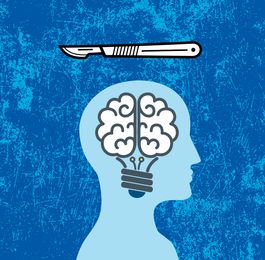My brain, usually occupied with the delicate dance of neurons and the existential hum of the prefrontal cortex, became a mosh pit of anxieties when THE WEEK asked me to write a column. I was fraught with thoughts of what could go wrong. I began to wonder, “Will people want to hear yet another surgeon penning his thoughts?” I imagined patients thinking, “If I ever fall sick, do I want to go to someone who might feature me in one of his articles?”
Despite being a brain surgeon, I am unable to fathom why the mind focuses more on the adverse than its converse. It’s probably because of a phenomenon called ‘negativity bias’, which is an evolutionary adaptation that prioritises unfavourable information as a survival mechanism, making us more sensitive to potential threats and dangers, and thus increasing our chances of avoiding harm.
Every single time when I am closing up a surgical case, I secretly wish to myself that nothing should go wrong. I want to survive. More importantly, I want the patient to go home safe. Yet, as Murphy says, anything that can go wrong, will go wrong. And, contrary to the cliché, it may not be entirely incorrect to call a doctor’s profession, ‘practice’ given that it is a highly iterative learning process involving other people’s lives. However proficient you may become, you can never predict when your next complexity rears its ugly head. We all make mistakes—and we all pay a price.
There is a difference between a mistake and a complication.
A complication most often is an adverse event caused by pre-existing factors that are outside the doctor’s control. A mistake, however, assumes there was a lapse of quality, control, or judgment by the surgeon. They both tread a fine line. Surgeons who tackle more difficult procedures or physicians who encounter more cryptic diagnostic dilemmas than others will face more obstacles, and they should not be penalised for grappling with them.
Same goes for the stories you are about to read. Some will be more complex than others. A few might be light and fun, while others might be gory and morbid. In some, you might empathise with the patient, and in others, the doctor might speak to you. It will sometimes be in your face, or it will be behind the scenes. Some might make you laugh, others will make you weep, and all will leave you thinking about what really goes on in a surgeon’s heart and mind.
Decision making under pressure is the key to survival, both for the patient and the doctor.
Patients are required to decide which doctor they will choose to operate upon themselves. Doctors must decide about when to operate and, more importantly, when not to operate. This is an imperfect and ambiguous science. It takes an average of 10 years and 10,000 hours of tenacious practice to achieve a reasonable amount of skill and judgment and become competent.
It is often the same thing with writers: what do I write, when should I write, and how much to write? Will it be accepted or rejected? Any art form can be so subjective. A friend said, “You can’t please everyone—you are not a jar of Nutella!” I beg to differ. I have seen patients weep with joy when I tell them their tumour is benign. I am a jar of Nutella... a slightly bloodier, more sleep-deprived one. What one might think is a great piece of writing, others might find frivolous. But I am going to write nonetheless. And being a surgeon, I am going to write like it cuts. I am going to write about where it hurts. I am also going to write like it heals.
The author is consultant neurosurgeon at Wockhardt Hospital, Mumbai.
mazdaturel@gmail.com @mazdaturel


